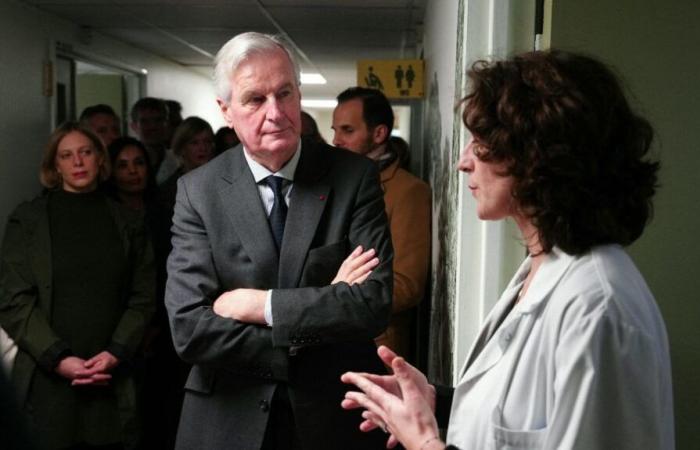File a complaint without going to the police station. The Prime Minister, Michel Barnier, announced, Monday, November 25, the extension of the system allowing women victims of domestic violence to take legal action directly from the hospital where they were treated. “From the end of 2025”the procedure will be proposed “in every hospital in France with an emergency department or a gynecological department”he promised, while visiting the Parisian Hôtel-Dieu hospital, on the occasion of the International Day Against Violence Against Women.
“We want to systematize and guarantee comprehensive support for each victim in a single, secure place,” defended the head of government, evoking a “outstretched hand” in a hospital environment for “avoid steps and sometimes discouragement” in the legal process. Franceinfo returns to this measure, its interest, but also its limits.
1 What does this device consist of?
In the Paris region, filing a complaint at the hospital has been possible in all AP-HP emergency departments since fall 2023. As long as the emergency doctor takes care of a person who has come “consult for trauma”he must ask her “if his consultation is linked to violence suffered in a marital context” and if she “wish to file a complaint”.
In the event of a complaint, “the doctor contacts the police using a dedicated telephone line” et “the hearing takes place within the emergency reception service, in a room made available by the hospital and guaranteeing confidentiality of exchanges”. The police patrol sent to the establishment appears in civilian clothes, for the sake of discretion and to facilitate the establishment of a bond of trust. Work to collect forensic evidence can also be carried out in parallel through samples, including in the absence of a complaint.
Use of this system is already possible in at least 236 French hospitals, according to the government. From one place to another, however, the practical arrangements differ. In many hospitals, such as in Rouen (Seine-Maritime) or Nantes (Loire-Atlantique), the procedure does not provide for intervention by the police or gendarmerie within the establishment. Victims are accompanied by medical staff to complete a simplified form, which is then sent directly by the hospital to investigators. A hearing of the complainant may take place at a later stage.
2 What is the point of this procedure?
It aims to further free the voices of victims, who cannot, or do not always dare, to open the door of a police station. “The point is to avoid the phenomenon of victims lost”defends emergency physician Benjamin Paule, one of the first to have tested the device, in 2020, in Cateau-Cambrésis (North). “We realize that there are many violent spouses waiting for victims in the hospital parking lot, that many patients change of opinion”he explained in 2023 on franceinfo. Without this device, some “would certainly have given up denouncing the facts suffered”also provides AP-HP. An observation shared by the Ile-de-France police officers.
“These victims would escape us if there was not this partnership with the hospital. They certainly would not have come, or perhaps too late to provide sufficiently solid evidence and testimony to a magistrate.”
Omar Merchi, police commissioner in Parisat franceinfo, in 2023
The victim may find it easier to confide in a medical environment. “In a police station, it's very authoritarian, while the nurses are more agreeable”said one of them, taken care of at the Rouen hospital, near France 3. “Going to the police station is always difficult”adds lawyer Michelle Dayan, president of the Lawyers for Women association, especially since the victims “are often afraid of not being believed”. “At the hospital, they feel safe”she greets on franceinfo.
By searching for complaints at the source, investigators save valuable time. “From the moment we quickly have the physical or psychological temporary total incapacities (ITT) and the victim’s declarations, these stages are already checked”thus described a Parisian police officer in 2023. An essential first step which makes it possible to accelerate the neighborhood investigation, the hearings of relatives, or even the possible placement of the suspect in police custody.
3 How will the extension of this system take place?
The use of this system will be extended to 377 structures by the end of 2025, i.e. “all hospitals that have an emergency department and a gynecological department”said the Secretary of State in charge of Equality between women and men, Salima Saa, Monday, on franceinfo. Many hospitals will therefore remain excluded from this measure, in a country which has 1,347 public health establishments, according to the Court of Auditors.
If the principle of the system is widely welcomed, the government's announcements are accompanied by a certain caution. It must be said that, from 2019, at the time of the Grenelle on domestic violence, the executive had already promised generalization by 2020. “Both on the side of the police and on the side of caregivers, there is a lack of resources which means that, already, for their traditional missions, they have difficulty doing everything. This is the reason why this measure is constantly announced and constantly postponed”underlines the president of the Women’s Foundation, Anne-Cécile Mailfert, on France 2.
“We already have a staggering stock of untreated complaints”adds lawyer Michelle Dayan, for whom “we will need means so that it is not just announcement effects”. Other actors are calling for strengthening the entire criminal chain. Filing a complaint at the hospital “unfortunately does not guarantee that the environmental investigation and the interrogation of relatives are systematically implemented”underlines lawyer Violaine de Filippis-Abate. Helping to file a complaint is one thing, preventing it from being dismissed is another.
If you are a victim of domestic violence, or if you are worried about a member of your entourage, there is an anonymous listening service, 39 19, reachable free of charge 24 hours a day, 7 days a week. This number guarantees anonymity people, but is not an emergency number like 17 (or 114 by SMS) which allows, in the event of immediate danger, to telephone the police or gendarmerie. It is also possible to send a report via instant messaging. Other information is also available on the Service-public.fr website.






